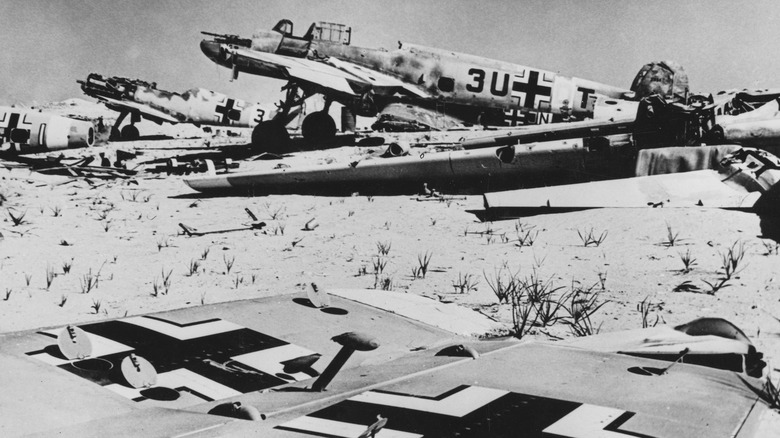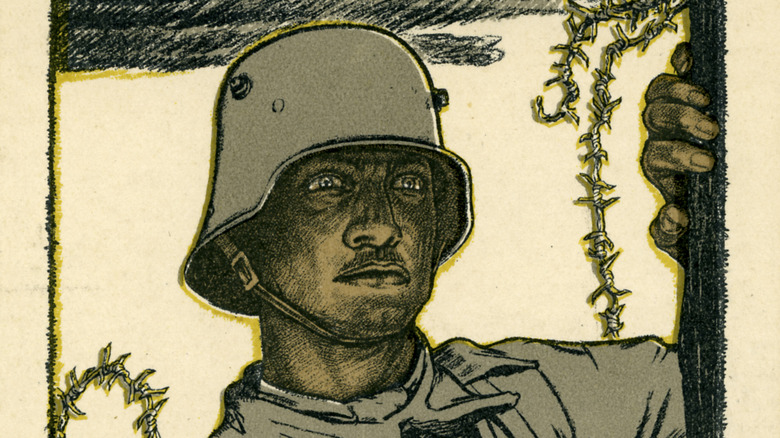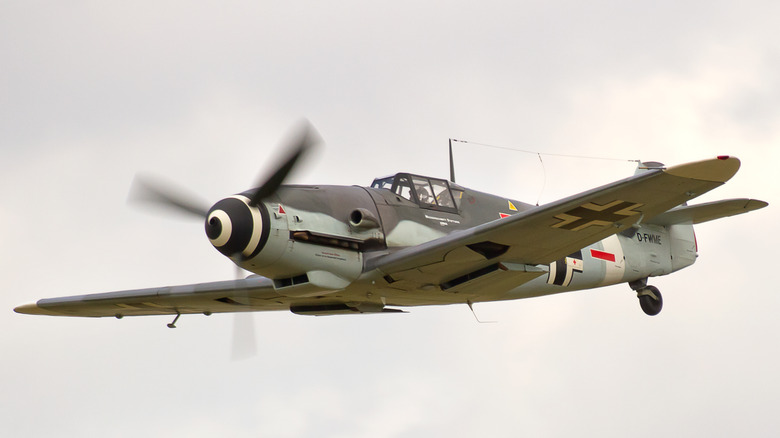How A School Project Led To A Startling World War II Discovery
It may be a bit uncomfortable to think about, but Europe is, to this day, chock-a-block with bits and pieces of World War II that have survived the decades. For example, in 2021, as NBC News reports, four people were injured when workers accidentally detonated a leftover World War II bomb in Munich. Similarly, in 2020 fishermen off the coast of England accidentally set off a bomb that had been sitting at the bottom of the sea for seven decades; they were lucky to have lived to tell about it, reports BBC News.
In 2017, a Danish teenager and his father turned up thousands of pieces of the remains of a World War II aircraft on their farm, after hearing his grandfather obliquely suggest for years that a German plane had crash-landed on the property. And after being assigned to do a World War II history project, the boy and his dad busted out the metal detectors, and soon found more than they bargained for.
Family lore
Every family has its more interesting, and in some cases, more salacious and toxic, bits of history and trivia. In 14-year-old Daniel Kristensen's family, that bit of history concerned the night the German luftwaffe set its sights on the town of Birkelse, in northern Denmark. Specifically, according to BBC News, the family believed that a German aircraft went down on the family's farm in November (or possibly December) of 1944. "He was telling a lot of stories, my grandfather," Daniel's dad said. "Some of them were not true, and some of them were true — but this one was true."
When Daniel was assigned to do a World War II history project for school, his dad joked with him that perhaps trying to find remnants of the plane would add some punch to his project. The family had long believed that the Germans had seen to it that the plane and its pilot were removed during the war, but, armed with metal detectors, they decided to see if they could find any remnants.
Roots and dirt
Daniel and his father, Klaus, grabbed some metal detectors and set about searching the remote section of the family farm where the plane was believed to have gone down seven decades ago. "I hoped we might find some old plates or something for Daniel to show in school," Kristiansen said. Remember, the family believed that the Germans had removed the plane decades ago; anything that remained of it would have certainly been buried under grass and other remnants of decades of being used for farming. Nevertheless, despite the father and son's belief that there was nothing to find, as The Washington Post reports, soon enough the metal detector was beeping.
Digging with shovels, the men were only able to dig so deep in the boggy soil, but the metal detector kept beeping. Frustrated by their limited equipment, Klaus borrowed an excavator, and before long, they'd found evidence of the remnants of a plane crash. According to The Sun, the pieces they found at first were small, but they kept getting bigger. And before long, they found more than they bargained for.
Human remains
It wasn't long before those scraps of metal that Daniel and Klaus were finding turned into something considerably more gruesome: human bones and fragments of a pilot's uniform. The teen and his father had not just found the remains of a Luftwaffe aircraft, they had found the remains of the pilot who went down with it. According to BBC News, they also found some artifacts belonging to the man.
"And then we found some personal things — books, a wallet with money ... Either it was a little Bible or it was Mein Kampf — a book in his pocket. We didn't touch it, we just put it in some bags ..." Klaus told the BBC.
The Washington Post also lists some other items found with the downed pilot, including tokens good for redemption at a nearby canteen (at a Danish base that had been taken over by the Germans), some coins, and even some condoms still in their wrappers. The pilot was later identified, although nothing containing his name was found at the site where he died. Rather, he was identified through some detective work, thanks to some of his personal effects that survived the crash, as well as German military records.
Identifying the pilot
Not long after Klaus and Daniel dug up the aircraft and the man who piloted it, who had been decaying on a family farm for seven decades, authorities were able to identify the pilot. According to The Local, two of the key pieces of evidence in the pilot's identity were his logbook, his handwritten name on the cover of his food coupon book, and his initials – HW – engraved on his watch.
As National Geographic reported, officials identified him as Hans Wunderlich. He was 19 years old when he died. He was not married nor did he have children, but was survived by his parents and a sister. Per The Local all were dead by the time Wunderlich's remains were found, and there were no other relatives to inform.
Wunderlich went down in October (not November or December, as the family suspected) of 1944. The Germans determined that he went down in marshy terrain, and declined to mount a search-and-rescue mission, saying it would be "in vain," per The Local. The pilot was officially declared dead in March 1945.
a Messerschmitt Bf 109
Of course, it wasn't just the remains of the pilot that Daniel and Klaus found that day. They also found, by their estimates, between 2,000 to 5,000 pieces of the aircraft, according to The Washington Post. Many of them were smaller than Daniel's hand, others were almost completely intact –- such as the plane's engine.
According to National Geographic, the remains of the wreckage and Hans Wunderlich's belongings are all being kept at Denmark's Historical Museum of Northern Jutland, while Wunderlich's remains were slated to be claimed by a German commission and interred in Germany.
Meanwhile, there was a more pressing problem for Klaus and Daniel: some of the metal fragments found from the crashed aircraft could have been live ammunition. That meant calling in a bomb disposal unit. But even that turned into a learning opportunity when Daniel was allowed to take the day off school "so that he can watch the police and bomb disposal people working. It's quite exciting for all of us," Klaus said, via The Sun.





